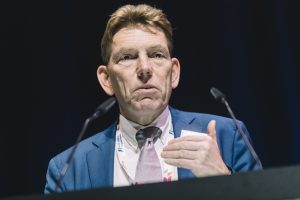ESCRS Education Forum Lunch Symposia

Colin Kerr
Published: Friday, February 15, 2019
 Professor Thomas Kohnen
Today Friday, February 15, two exciting lunchtime ESCRS Education Forum symposia will be taking place.
In the first programme Professors Thomas Kohnen and Rudy Nuijts will lead a panel of refractive IOL experts in discussing key elements in managing preoperative, lens selection and postoperative topics related to presbyopia and astigmatism management.
In addition to the moderator, the faculty includes Drs. Cochener, Ribeiro, Carones, Findl and Srinivasan. Didactic presentations will focus on the preoperative planning, a review of the latest data on trifocal and EDOF IOL options, key considerations for the presbyopic astigmatic patient, and tips for mitigating post-operative error in refractive IOL patients. The programme will also include panel discussion on several topics including how to match presbyopia correction patient expectations with treatment options.
This session will review key data from the 2017 ESCRS Clinical Survey of over 1,800 delegates. Some of the data discussed will review the significant increase in the use of Trifocal and EDOF technology in presbyopia patients between 2016 and 2017. Also, the group will discuss why ESCRS delegates state that 35% of their cataract patients with clinically significant astigmatism would receive a Toric IOL if costs were not an issue. However, the actual percentage of today’s implants are much lower.
This ESCRS Education Forum will take place on Friday in Hall Skalko as from 12:45-14:15. The programme is eligible for CME credit. This programme is supported by unrestricted grants from Alcon and Johnson & Johnson Vision.
The second Friday lunch programme is moderated by Dr. Beatrice Cochener leading a panel of experts on ocular surface disease, from diagnosis to treatment decisions.
The faculty for the programme includes Drs Kymionis and Labetoulle. Presentations will review the impact of OSD on surgical outcomes, how to use diagnostic tools to better understand the ocular surface and a review of treatment management decisions in various types of OSD patients.
ESCRS Clinical Survey reviewed in this programme includes discussion of the use of most OSD tests on a case-by-case basis, instead of their use at the initial point of care. Also, the data shows about 45% of delegates are not using a dry eye questionnaire. The faculty will also review the different in ESCRS delegate preferred treatments for moderate dry eye, severe dry eye and MGD.
This ESCRS Education Forum will take place on Friday in Room MC 3 from 13:00-14:00. The programme is eligible for CME credit. This programme is supported by unrestricted grants from Shire and Johnson & Johnson Vision.
Professor Thomas Kohnen
Today Friday, February 15, two exciting lunchtime ESCRS Education Forum symposia will be taking place.
In the first programme Professors Thomas Kohnen and Rudy Nuijts will lead a panel of refractive IOL experts in discussing key elements in managing preoperative, lens selection and postoperative topics related to presbyopia and astigmatism management.
In addition to the moderator, the faculty includes Drs. Cochener, Ribeiro, Carones, Findl and Srinivasan. Didactic presentations will focus on the preoperative planning, a review of the latest data on trifocal and EDOF IOL options, key considerations for the presbyopic astigmatic patient, and tips for mitigating post-operative error in refractive IOL patients. The programme will also include panel discussion on several topics including how to match presbyopia correction patient expectations with treatment options.
This session will review key data from the 2017 ESCRS Clinical Survey of over 1,800 delegates. Some of the data discussed will review the significant increase in the use of Trifocal and EDOF technology in presbyopia patients between 2016 and 2017. Also, the group will discuss why ESCRS delegates state that 35% of their cataract patients with clinically significant astigmatism would receive a Toric IOL if costs were not an issue. However, the actual percentage of today’s implants are much lower.
This ESCRS Education Forum will take place on Friday in Hall Skalko as from 12:45-14:15. The programme is eligible for CME credit. This programme is supported by unrestricted grants from Alcon and Johnson & Johnson Vision.
The second Friday lunch programme is moderated by Dr. Beatrice Cochener leading a panel of experts on ocular surface disease, from diagnosis to treatment decisions.
The faculty for the programme includes Drs Kymionis and Labetoulle. Presentations will review the impact of OSD on surgical outcomes, how to use diagnostic tools to better understand the ocular surface and a review of treatment management decisions in various types of OSD patients.
ESCRS Clinical Survey reviewed in this programme includes discussion of the use of most OSD tests on a case-by-case basis, instead of their use at the initial point of care. Also, the data shows about 45% of delegates are not using a dry eye questionnaire. The faculty will also review the different in ESCRS delegate preferred treatments for moderate dry eye, severe dry eye and MGD.
This ESCRS Education Forum will take place on Friday in Room MC 3 from 13:00-14:00. The programme is eligible for CME credit. This programme is supported by unrestricted grants from Shire and Johnson & Johnson Vision.